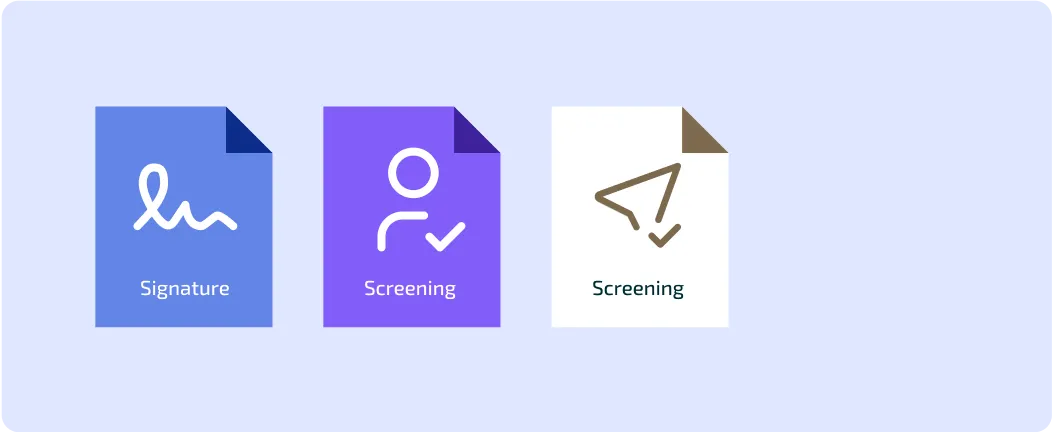.webp)
Published on
April 15, 2025
KYC in Saudi Arabia: Regulations, Compliance & Penalties
In this story

Accelerate AML Compliance: Meet Regulatory Demands with 80% Less Setup Time
.svg)
.svg)
76% of the global population have access to financial services, and national and international regulatory bodies oblige financial institutions to verify their customers’ identities not only when they join the institution but also on an ongoing basis; otherwise, the institution should expect hefty fines and penalties.
This process can be challenging for financial institutions, especially when the institution is verifying the identity of non-residents, deals with a high volume of clients, or manages high-risk customers.
Saudi Arabia is an appealing destination for FinTech companies and startups and thus, it can be prone to different types of financial crimes. KYC in Saudi Arabia is essential for complying with the country’s regulations.
What is Know Your Customer?
Know Your Customer (KYC) is a process mandated by regulatory bodies on all financial institutions and extends over three stages:
- The Customer Identification stage (CIP) is the initial stage where the institution collects data like the full name, date of birth, and residential address. That's for individuals; as for businesses, the institution verifies corporate details like registration and UBO information.
- Then, the institution assesses the risk of the customer, whether an individual or a business, and based on their risk score, they will either undergo Customer Due Diligence (if low or medium risk) or Enhanced Due Diligence (and this is for high-risk customers like PEPs and their relatives).
- And of course, KYC is not a one-time process. On the contrary, it needs ongoing and continuous monitoring to keep the customer's profile updated regularly.
All these stages together enable the institution to comply with national and international regulations and hence avoid risks and penalties.
What is KYC in Saudi Arabia?
KYC, or Know Your Customer, is the process of verifying the identity of your customers before doing business with them. In Saudi Arabia, this process is particularly crucial because it helps financial institutions prevent fraud, money laundering, and terrorist financing.
This is especially true for companies entering the Saudi market as they must familiarize themselves with the nation’s strict AML regulations because violating these rules can result in severe consequences, including prison sentences of up to 15 years.
In fact, since the 2018 FATF evaluation of Saudi Arabia’s efforts to combat money laundering and terrorist financing, the Kingdom has implemented several measures to enhance its AML/CFT framework. These actions reflect the country's commitment to strengthening its financial regulations and aligning more closely with international standards.
The Importance of KYC in KSA
Illegal activities, including financial crimes in KSA, bring in between $12 billion and $32 billion yearly, and what's more concerning is that 70% to 80% of the money from these crimes leaves the country. This factor with the geographic risks the country faces, mean that Saudi Arabia has a considerable role to play as a leading economy in the region.
In a market with these serious risks, AML KYC in Saudi Arabia is a necessity for financial institutions to be able to spot suspicious activities, which helps prevent illegal financial crimes before they happen.
In other words, AML KYC in Saudi Arabia is crucial because it helps in:
- Stopping financial crimes like money laundering.
- Protecting customers from crimes like identity theft and account takeover fraud.
- Building trust and boosting reputation.
- Empowering national security and tracking potential security threats.
KYC in Saudi Arabia: How to Comply?
Following international standards and FATF recommendations, KYC in KSA involves a few key steps to ensure that banks and financial institutions know their customers and are complying with the law:
- Customer Identification: The first step is gathering basic information about the customer. This includes their name, date of birth, nationality, and occupation.
- Document Verification: As part of the KYC verification process, customers need to show official documents to prove their identity. This could be a passport, national ID card, or another of valid ID. The goal here is to make sure the documents are real and not fake.
- Address Verification: Financial institutions also check where the customer lives as part of their KYC verification procedure. To do this, they ask for KYC documents in KSA like utility bills, bank statements, or any other official document that shows the customer’s address.
- Risk Assessment: Banks and financial institutions assess the customer’s risk level, they look at factors like where the customer’s money comes from, what their business is, and whether they are involved in politics. This helps to figure out if the customer might be at a higher risk for financial crimes.
- Ongoing Monitoring: AML/KYC isn’t something that happens once and then stops. Financial institutions keep track of customers’ profiles over time, looking for anything unusual or suspicious or a change of status.
- Record Keeping: Lastly, institutions must keep records of all actions and audit trails. This includes the information gathered during the KYC process and any supporting KYC documents in KSA. These records need to be kept safe and easy to find if a regulator comes to check. Usually, it is recommended to keep the records for at least 5 years.
Comply quickly with local/global regulations with 80% less setup time
.svg)
.svg)
Who Must Follow KYC Regulations in Saudi Arabia?
In Saudi Arabia, the following entities must adhere to KYC regulations:
- Banks
- Insurance Companies
- Money Exchange Services
- Investment Firms and Brokers
- Real Estate Companies
- Fintech Companies
- Credit Card Issuers
- Commercial companies
- Sole proprietorships
- Other Financial Services Providers
Who Regulates AML/KYC in Saudi Arabia?
Know Your Customer Compliance in KSA is regulated by different Saudi authoritative bodies and we listed the prominent ones:
- The Ministry of Anti-Money Laundering which was founded by the Minister of Trade and Industry
- The Capital Markets Authority (CMA)
- The Communications and Information Technology Commission (CITC)
- The Saudi Central Bank (previously known as SAMA)
- The Saudi Arabia Financial Intelligence Unit (SAFIU)
- The Saudi Arabian Monetary Agency
Also, Know Your Customer compliance in Saudi Arabia adheres to international rules and regulations. In fact, KSA joined FATF in 2019 (and still is a member) and is an active member of MENAFATF. Also, KYC compliance in KSA is influenced by and has integrated and follows many of FATF's recommendations, so the overall AML/KYC in Saudi Arabia is in alignment with global AML/CFT standards.
Penalties for Non-Compliance with AML/KYC in Saudi Arabia
The Anti-Money Laundering Law in Saudi Arabia, originally enacted by Royal Decree, was updated in 2017 (Royal Decree No. M/20) to reinforce measures against financial crimes.
This law criminalizes the laundering of proceeds obtained from predicate offenses such as illicit drug trafficking, weapon smuggling, counterfeiting, and other activities that are considered crimes under Sharia law or statutory laws in the Kingdom.
Penalties for Money Laundering
- Fines: Convicted individuals or entities may face monetary fines of up to 7 million SAR.
- Imprisonment: The law allows for jail terms of up to 15 years.
- For Saudi Nationals: Convicted individuals are banned from traveling abroad for a period equivalent to their prison sentence.
- For Non-Saudis: Foreign nationals found guilty of money laundering face deportation after serving their sentence.
1. Special Considerations
The law applies to all types of proceeds, including cash, assets, property, and economic resources. It also ensures that a conviction for money laundering does not depend on the conviction for the predicate offense. For example, laundering funds from drug trafficking or counterfeiting is punishable even if the original crime is not formally prosecuted.
2. Reduced Penalties
The law provides a path for reduced penalties if offenders voluntarily report their crimes before they are discovered by authorities or assist in the capture of other offenders or the recovery of illegal funds. This incentivizes cooperation with law enforcement and helps to dismantle criminal networks.
Know Your Customer Compliance in KSA with FOCAL
As technology advances, financial institutions are increasingly using eKYC tools to speed up and improve the accuracy of the KYC process. FOCAL AML Compliance and Fraud Prevention solutions use smart AI tools to check customer information, assess risks, and continuously track transactions over time.
This saves time and helps banks and businesses stick to the strict rules in Saudi Arabia. FOCAL platform is especially good for KSA because it understands the country’s unique laws and naming systems. By automating tricky KYC compliance tasks, FOCAL helps financial institutions protect against fraud and comply with AML/KYC regulations while working faster and smarter.
Conclusion
KYC in Saudi Arabia is essential for keeping the financial system safe, transparent, and trustworthy. By following the steps of KYC AML Compliance in KSA, using the latest technology, and staying up-to-date with regulations, financial institutions can help protect their customers and ensure the smooth functioning of Saudi Arabia’s economy.
Frequently Asked Questions about KYC in Saudi Arabia
Q1. Why is KYC important in Saudi Arabia?
KYC helps keep the financial system secure, preventing illegal activities like money laundering and fraud. It also ensures Saudi Arabia meets international KYC AML compliance standards.
Q2. How long must KYC records be kept?
According to the Saudi Central Bank, financial institutions must keep KYC records for at least five years.
Q3. Can customers refuse to provide KYC information?
While customers have the right to refuse, doing so may result in the bank denying them service since KYC is mandatory for all financial transactions.
Q4. Is KYC in Saudi Arabia a one-time process?
No, KYC isn’t a one-off process. Banks must update customer information periodically and continue monitoring their transactions.
Q5. Is Saudi Arabia a high-risk country for money laundering?
Saudi Arabia isn’t seen as high-risk by the FATF, but it does face some risks due to its large economy and role in international trade.
Streamline Compliance: Achieve 80% Faster Setup for Fraud Prevention
.svg)
.svg)

How Aseel reduced onboarding time by more than 87% using FOCAL
Learn how FOCAL empowered Aseel to achieve new milestones.
.svg)
.svg)
Mastering Fraud Prevention: A Comprehensive Guide for KSA and MENA Businesses
51% of organizations fell victim to fraud in the last two years, don't be caught off guard, act proactively.
.svg)
.svg)
Featured blog posts
.svg)





AI-Driven Precision in Fraud Risk and AML Compliance
.svg)
.svg)

.svg)
.png)






.webp)




.svg)








%20(1).webp)
Comments
Leave a Reply
Comment policy: We love comments and appreciate the time that readers spend to share ideas and give feedback. However, all comments are manually moderated and those deemed to be spam or solely promotional will be deleted.